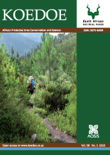
KOEDOE
Scope & Guideline
Elevating the conversation in ecology and environmental science.
Introduction
Aims and Scopes
- Cultural Heritage Management:
Research on the preservation and promotion of cultural heritage within national parks, emphasizing the role of cultural landscapes and the historical significance of archaeological sites. - Biodiversity and Conservation Strategies:
Studies that explore animal diversity, ecological interactions, and conservation strategies within South African parks, aiming to understand and mitigate human impacts on wildlife. - Social and Economic Implications of Conservation:
Investigations into the social dynamics and economic consequences of conservation practices, including the impact on local communities and tourism. - Geological and Environmental Studies:
Research focusing on the geological and environmental characteristics of national parks, including geochemical analyses and ecological assessments. - Ecotourism and Visitor Management:
Exploration of the intersections between tourism, visitor behavior, and park management, with an emphasis on sustainable practices and visitor experiences.
Trending and Emerging
- Cultural Landscapes and Heritage:
There is a growing emphasis on the importance of cultural landscapes, with research exploring how these areas can be managed and preserved in conjunction with ecological conservation. - Visitor Impact and Management Strategies:
Recent studies increasingly focus on understanding the behaviors and impacts of visitors in national parks, highlighting the need for effective management strategies to balance conservation and tourism. - Climate Change and Biodiversity:
The impact of climate change on biodiversity and its implications for conservation strategies is becoming a significant theme, reflecting global concerns over environmental changes. - Community Engagement in Conservation:
Research is trending towards exploring how local communities can be actively engaged in conservation efforts, emphasizing collaborative approaches to park management. - Technological Innovations in Conservation:
The use of technology, such as drones and advanced monitoring systems, is gaining traction in conservation research, offering new methodologies for studying wildlife and habitats.
Declining or Waning
- Historical Archaeology:
Research on historical archaeological sites has decreased, possibly due to a shift towards contemporary cultural heritage issues and the immediate impacts of modern conservation practices. - Traditional Ecological Knowledge:
There appears to be a waning focus on traditional ecological knowledge and its integration into modern conservation practices, as more emphasis is placed on scientific approaches. - Invasive Species Management:
While still relevant, the specific study of invasive species management strategies seems to be less frequently addressed, potentially overshadowed by broader ecological assessments.
Similar Journals

Conservation Letters
Leading the Charge in Open Access Conservation KnowledgeConservation Letters, published by Wiley, is a premier peer-reviewed journal dedicated to advancing the field of conservation science. As an Open Access journal since 2015, it provides researchers, practitioners, and policymakers with immediate access to cutting-edge research and insights that shape effective conservation strategies globally. With an impressive impact factor and a distinguished standing in the academic community—ranking in the Q1 category in disciplines such as Ecology, Evolution, and Nature Conservation—the journal plays a vital role in disseminating high-quality research that informs environmental practices. Based in the United States, it encompasses a broad scope of topics aimed at bridging scientific findings with real-world applications, effectively contributing to the understanding and preservation of biodiversity. Researchers looking to publish innovative work in an influential platform will find Conservation Letters an essential venue for ensuring their research reaches an engaged international audience.
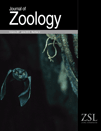
JOURNAL OF ZOOLOGY
Bridging foundational research with innovative zoological studies.JOURNAL OF ZOOLOGY, published by Wiley, stands as a premier scholarly journal in the fields of Animal Science and Zoology, renowned for its outstanding contributions to the knowledge of animal biology and ecology. With an impressive impact factor and a strong ranking in the Q1 category for Animal Science and Zoology, as well as Q2 for Ecology, Evolution, Behavior, and Systematics, the journal rigorously engages with both foundational research and groundbreaking discoveries since its inception in 1830. Located in Hoboken, New Jersey, this journal is dedicated to fostering the academic community's understanding of zoological sciences, providing access to important research that shapes wildlife conservation efforts and ecological studies. Although the journal does not currently offer open access options, it continues to attract significant attention, as evidenced by its strong Scopus rankings in related categories. Researchers, professionals, and students will find invaluable resources in the JOURNAL OF ZOOLOGY to advance their understanding of animal life and the ecological challenges it faces today.
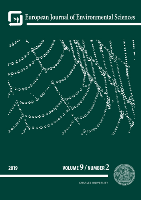
European Journal of Environmental Sciences
Innovating Insights into Pressing Environmental ChallengesEuropean Journal of Environmental Sciences is a prominent open-access journal dedicated to disseminating high-quality research in the field of environmental science. Published by Charles University, Faculty of Mathematics & Physics, this journal has been a vital platform since 2011, facilitating free access to insightful studies and findings pertinent to pressing environmental issues. Its scope encompasses crucial topics in Ecology, Management, Monitoring, Policy, Law, Nature and Landscape Conservation, and Pollution. With a significant presence in the academic community, the journal currently holds a Q3 and Q4 category ranking in various subfields of environmental science, as assessed in 2023, showcasing its relevance and impact in the discipline. Researchers, professionals, and students engaging with the European Journal of Environmental Sciences will find it an essential resource for enhancing their understanding of environmental challenges and contributing to innovative solutions.
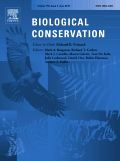
BIOLOGICAL CONSERVATION
Fostering Innovative Solutions for Ecological Challenges.BIOLOGICAL CONSERVATION, published by Elsevier Science Ltd, is a leading international journal dedicated to advancing the science and practice of biological conservation. Since its inception in 1968, the journal has provided a critical platform for researchers, professionals, and students in the fields of Ecology, Evolution, Behavior, and Systematics as well as Nature and Landscape Conservation. With an impressive impact factor, and ranked in the Q1 category within both ecological and conservation domains in 2023, it emphasizes high-quality empirical and theoretical research essential for understanding and addressing pressing environmental challenges. Although it follows a subscription model, the journal is known for its rigorous peer-reviewed articles that contribute significantly to the field, ensuring that the latest findings and methodologies are readily accessible to practitioners. As a vital resource for those engaged in conservation efforts globally, BIOLOGICAL CONSERVATION stands out for its commitment to enhancing knowledge and informing strategies that safeguard biodiversity across ecosystems.
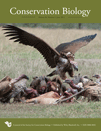
CONSERVATION BIOLOGY
Bridging research and action for biodiversity protection.CONSERVATION BIOLOGY, published by Wiley, is a leading journal in the field of ecology and conservation, with a focus on disseminating high-quality research that addresses pressing environmental challenges. With a strong impact factor and categorized in the top quartile (Q1) across various relevant fields including Ecology, Evolution, Behavior and Systematics, and Nature and Landscape Conservation, the journal plays a pivotal role in advancing the scientific understanding of biodiversity and conservation practices. Since its establishment in 1987, CONSERVATION BIOLOGY has provided a vital platform for researchers, professionals, and students to share innovative findings and facilitate discussions surrounding ecological sustainability and conservation strategies. Although it is not an open-access publication, it ensures that a wide range of significant research is accessible to the global scientific community. The journal’s rigorous peer-review process and reputation for excellence make it an essential resource for anyone involved in the study of ecology and conservation.

Journal of Zoological and Botanical Gardens
Bridging the Gap Between Wildlife and Plant SciencesJournal of Zoological and Botanical Gardens, published by MDPI, serves as a leading platform dedicated to the interdisciplinary exploration of both zoological and botanical research. With its base in Switzerland, this open-access journal fosters global accessibility, allowing researchers and professionals to disseminate and engage with cutting-edge studies and findings in the realms of agricultural and biological sciences, as well as veterinary sciences. Holding a commendable Q2 ranking in both categories (2023) and positioned in the 68th percentile for agricultural and biological sciences (rank #61/193) and 67th percentile for veterinary studies (rank #12/35), it reflects the high quality and relevance of the publications. The journal covers a range of topics from ecological assessments to conservation strategies, aiming to bridge the gap between wildlife management and plant sciences. Researchers, professionals, and students alike will find valuable insights and opportunities for collaboration within its pages. The journal’s commitment to fostering innovative research makes it an essential resource for anyone interested in the dynamic interactions between flora and fauna.

Journal of Wildlife and Biodiversity
Empowering research to safeguard ecosystems.Journal of Wildlife and Biodiversity, published by Arak University in Iran, is an Open Access journal that has been contributing to the fields of wildlife science and biodiversity since its inception in 2017. With an E-ISSN of 2588-3526, this journal serves as a vital platform for researchers, professionals, and students alike, dedicated to disseminating significant findings related to animal sciences, ecology, and environmental conservation. Despite its current Q4 ranking in various categories (Animal Science, Ecology, and Nature and Landscape Conservation) according to the 2023 metrics, the journal's commitment to advancing knowledge in wildlife and biodiversity remains unwavering. Although the journal's Scopus coverage has been discontinued since 2024, it continues to cater to a wide audience by promoting innovative research and fostering collaborations in the academic community, ultimately aiming to enhance understanding and conservation strategies for wildlife and their habitats.
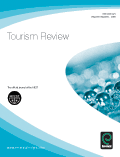
Tourism Review
Connecting academia and practice in tourism development.Tourism Review, published by Emerald Group Publishing Ltd, stands as a premier academic journal dedicated to advancing the field of tourism studies, with an impressive focus on geography, planning, and development. This journal, which has been contributing to the academic community since 2001, is ranked in the top quartile (Q1) for both Geography, Planning and Development and Tourism, Leisure and Hospitality Management, reflecting its significant impact and authority in the sector. With an exceptional standing in Scopus rankings—14th out of 821 in Social Sciences and 15th out of 146 in Business, Management, and Accounting—Tourism Review provides rigorous, peer-reviewed research that is essential for scholars, practitioners, and students engaged with contemporary tourism issues. This journal serves as a crucial platform for disseminating knowledge and fostering innovative solutions within the tourism sector, thereby contributing to sustainable development and enriching the experience of travelers worldwide. Although not an open-access journal, it offers valuable insights and comprehensive research suitable for those who wish to deepen their understanding of tourism dynamics.

Journal of Fish and Wildlife Management
Empowering biodiversity through critical insights.The Journal of Fish and Wildlife Management, published by the U.S. Fish & Wildlife Service, serves as a vital resource for scholars, researchers, and professionals in the fields of Animal Science, Ecology, and Conservation Biology. With its ISSN 1944-687X, this esteemed journal has been disseminating critical research findings since 2010, contributing significantly to the understanding of fish and wildlife conservation practices and their ecological impacts. Despite its Q3 category rankings in various disciplines as of 2023, it provides a platform for innovative research that influences policy and management strategies for biodiversity conservation. The journal, although not open access, remains committed to advancing the scientific discourse surrounding wildlife management with articles that emphasize practical conservation efforts and ecological sustainability. Readers can expect a diverse range of articles that promote best practices in the management and conservation of fish and wildlife resources, furthering our collective mission of preserving ecological health and biodiversity for future generations.

Tropics
Driving innovation in understanding tropical ecosystems.Tropics, published by the Japan Society for Tropical Ecology, is a prominent journal dedicated to advancing the field of tropical ecology, conservation, and environmental science. With an ISSN of 0917-415X and E-ISSN of 1882-5729, this journal has become a vital resource for researchers, professionals, and students interested in the intricate dynamics of tropical ecosystems. Although it operates as a non-open access publication, it continues to foster academic discourse and collaboration, evident from its various Scopus rankings across categories such as Environmental Science and Agricultural and Biological Sciences. As of 2023, Tropics stands resilient in its mission, providing invaluable insights, promoting sustainable practices, and addressing pressing ecological challenges within tropical environments. The journal’s contributions have been acknowledged since its inception in 1997, making it an essential part of the scientific literature landscape and a key player in supporting tropical ecological research.